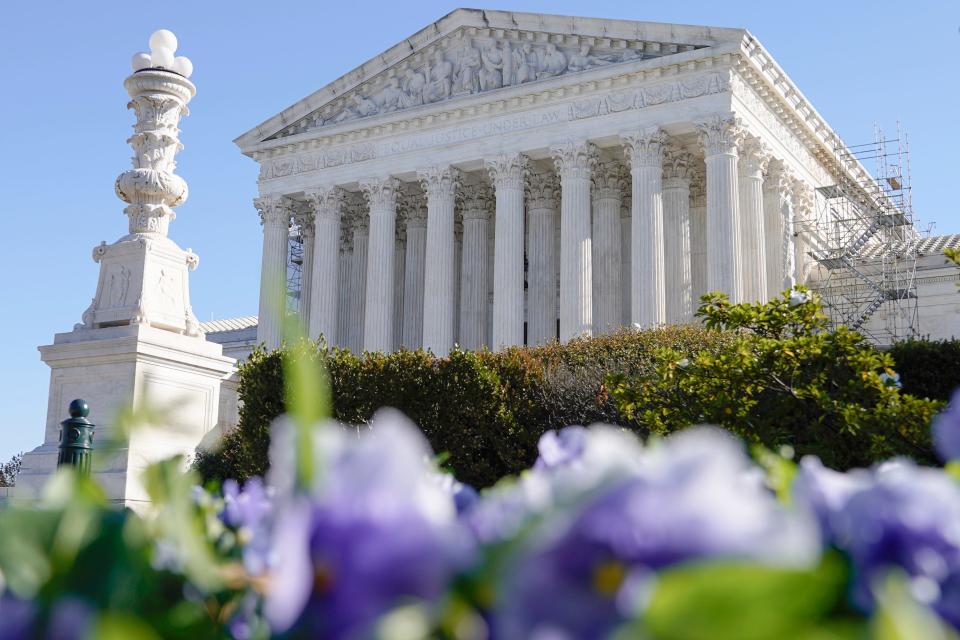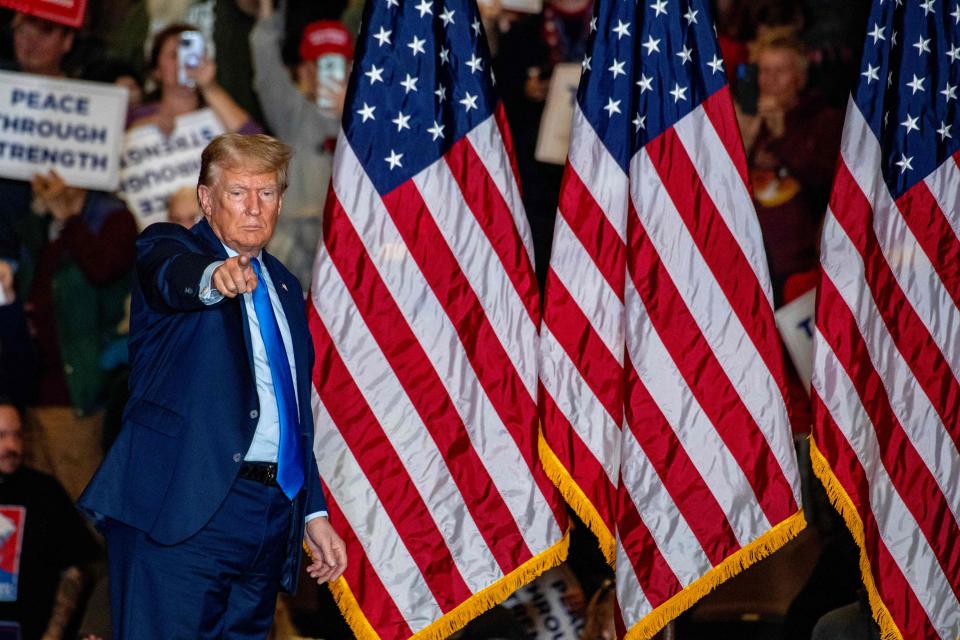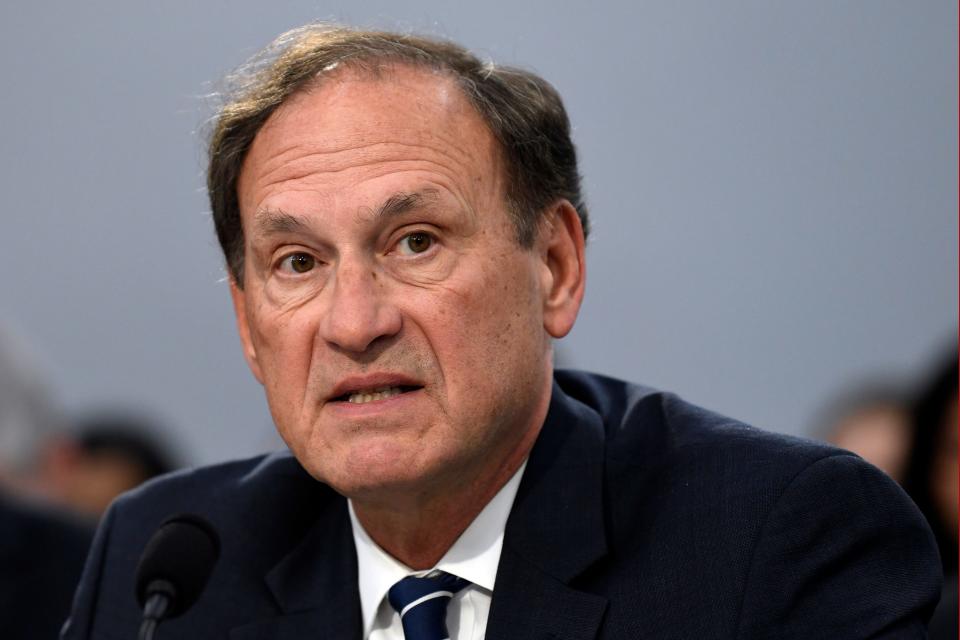This couple is fighting $15,000 in taxes. Their case could cost Washington trillions
- Oops!Something went wrong.Please try again later.
- Oops!Something went wrong.Please try again later.
WASHINGTON – It started as a fight over $14,729 in taxes that the government said Charles and Kathleen Moore owed on an investment they made on a company in India.
But their lawsuit, which the Supreme Court heard Tuesday, could wind up costing the government trillions, prompting follow-on lawsuits challenging a wide swath of federal taxes and upending proposals some Democrats have floated for years to tax the ultra-rich. During two hours of argument, a majority of the justices signaled they are hesitant to weigh into that broader debate.
The legal question in the case involves how to define income for tax purposes. But the Supreme Court’s decision − whether it sides with the Moores or against them − could have sweeping implications for how much the government can dip into the earnings of wealthy Americans who can shield those holdings from taxes.
Arguments: Supreme Court split on whether the Sackler family can be sued over opioid crisis
The Moores, a retired couple who live in Washington state, frame their case in simple terms: they never received a profit from their investment. Those profits were instead reinvested into the company, KisanKraft, which sells farm equipment in India. Because they never “realized” that income, the Moores claim, they can’t be taxed on it.
“If you haven’t received any income, how can you be required to pay income taxes?” Charles Moore asks in a video posted by the Competitive Enterprise Institute, a libertarian group that is representing the Moores. “It seemed, to both of us, unconstitutional.”
Tax cases often come and go at the Supreme Court without much fuss. But the Moores’ suit has prompted considerable attention, in part because of the potential to destabilize the tax system and partly because it has been viewed in some quarters as a proxy battle over proposed wealth tax
A narrow ruling for the Moores could cost the government billions of dollars and provide a path for challenging other provisions of the tax code, said Josh Odintz, a lawyer at Holland & Knight who helped craft a brief supporting the government’s position. A wide-ranging ruling, he said, could “invalidate large parts of the Internal Revenue Code” and cost the government more than $5 trillion.
A ruling for the government, he said, would "preserve the Internal Revenue Code."
During arguments Tuesday, several members of the court's conservative majority signaled skepticism over siding with the Moores' position that income must categorically be "realized" before it can be taxed. They also appeared to be searching for a narrow outcome − regardless of who won.
Even if the court declines to get into whether “realization” is required, Justice Brett Kavanaugh said, the justices could decide the issue narrowly. There was realization, he said, for the company the Moores invested in − if not the Moores themselves. Congress in its law chose to "attribute" those earnings to the shareholders, Kavanaugh said, “in a manner consistent with how Congress has done that in and this court has allowed.”

A Trump tax arrives at the Supreme Court
The provision at issue was included in a massive tax overhaul package approved by Republicans in Congress and signed by former President Donald Trump in 2017. The law reduced the corporate tax rate but it included a one-time tax on earnings of U.S. shareholders in certain foreign companies.
Income tax is relatively straightforward when it's applied to Americans' paychecks. An employee receives money, or income, from their employer and state and federal governments take a percentage of it. But investments are generally not taxed until they’re “realized,” or cashed out. The Moores claim that because their profits in the form of dividends were reinvested into the company, the earnings can’t be considered income for tax purposes.
"Appreciation in the value of a home or other asset is not income − at least, not until it is sold and the gain is realized," lawyers for the Moores told the Supreme Court. "Realization is not only what distinguishes income from property in general, but what makes income income."
The Biden administration, in defending the Trump-era law because of its concern about upending federal taxes, countered that nothing in the Constitution bars Congress from taxing unrealized income and that similar taxes have been place since the mid-19th century. Invaliding the tax, according to the Justice Department, could cost the federal government $340 billion over the next decade.
It would also almost certainly prompt challenges to other, similar taxes.
During arguments on Tuesday, some of the justices repeatedly appeared to be having a proxy debate over a wealth tax − or taxing a person's assets rather than their income. President Joe Biden, for instance, has proposed a “billionaire’s tax” that would apply to unrealized gains on assets that have increased in value on American households worth more than $100 million.
Led by Justice Samuel Alito, those members of the court pressed the lawyer for the Biden administration, Solicitor General Elizabeth Prelogar, to explain the impact of accepting her position.
"I want to understand the limits of your position," Alito said. "What about the appreciation of holdings in securities by millions and millions of Americans? Holdings in mutual funds...Can those be taxed under the 16th Amendment?"
Prelogar said that if Congress enacted a tax like that the government would defend it as an income tax, though she noted that lawmakers have never approved a tax like that.
"Would you agree, general, that when the court opens a door, Congress tends to walk through it?" Justice Neil Gorsuch asked Prelogar, signaling that her broader definition of "income" could prompt policies like a wealth tax.
The 'door is already open'
Prelogar fired back: "That door is already open."
A wealth tax is unlikely to gain traction in Congress for political reasons − a point Kavanaugh raised.
"On the proverbial open door for Congress, members of Congress want to get reelected," he said.

Alito balks at calls to recuse
In addition to taxes, the case touched on some of the Supreme Court's recent ethics scandals.
David Rivkin, one of the lawyers representing the Moores, co-authored two favorable opinion pieces in the Wall Street Journal this year based on interviews with Justice Samuel Alito. Because of that, Senate Democrats called for Alito to recuse himself from the tax case.
Senate Judiciary Committee Chairman Dick Durbin, D-Ill., criticized Alito for "sitting on a case involving a lawyer who honored him with a puff piece in the Wall Street Journal."
Alito balked at that request earlier this year. In an unusual four-page statement, he dismissed it as "unsound” and said there was “no valid reason for my recusal in this case." Alito noted other justices who sat for interviews with media and then declined to recuse in cases involving those companies.

Just the facts. All of them.
Tax filings in India by KisanKraft have raised questions about the narrative the groups representing the Moores have presented to the Supreme Court. The documents were first reported by Tax Notes, a publication for tax professionals.
Those documents show that Charles Moore, far from being a distant investor, served on the company’s board for years. Other records show Moore made subsequent investments in the company that were not disclosed to the Supreme Court.
The revelations were only the latest to involve questions about the factual record in a high-profile Supreme Court case. Last year, in a matter involving a website designer named Lorie Smith who wanted to decline to make sites for same-sex couples, the record identified a man who attorneys claimed indicated he might want to hire Smith to make a site for him. That man later told reporters he was married to a woman and made no such request of Smith.
A group called Patriotic Millionaires sent a letter to the Supreme Court last month asserting that the “factual background presented to you is not remotely accurate.” Dan Greenberg, an attorney for the Moores, said in a statement that he was “confident that our filings are candid and accurate.”
This article originally appeared on USA TODAY: Supreme Court case over $15,000 could cost the government trillions

